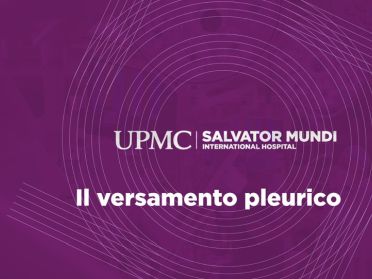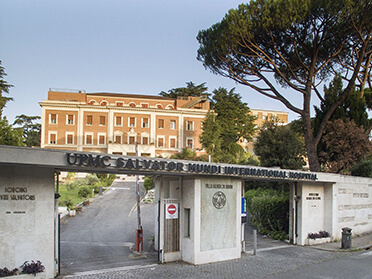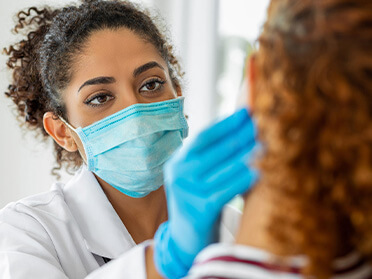Pneumology at UPMC Salvator Mundi International Hospital
Quality of life depends a lot on breathing, a vital but often neglected activity for which adequate prevention is not yet widespread. You can turn to UPMC Salvator Mundi International Hospital for the prevention, early diagnosis, and treatment of various lung diseases.
With a multidisciplinary approach, our specialists will be able to offer you individualized treatment paths and cutting-edge treatments in the pulmonary and oncological fields. You can face a complete diagnostic procedure, making use of all the instrumental diagnostic investigations necessary for a complete check-up.
At UPMC Salvator Mundi, you can also perform CAT scans, MRIs, radiological examinations or you can undergo thoracic surgery, minimally invasive interventional bronchoscopy (including stents with prostheses) and follow personalized oncological therapy programs. A complete process that assists you until rehabilitation.
Conditions We Treat
- Occupational asthma.
- Chronic Obstructive Pulmonary Disease (COPD).
- Interstitial lung disease.
- Acute bronchitis.
- Respiratory infections, bronchiectasis, abscesses, infectious pleurisy.
- Respiratory failure.
- Community-acquired pneumonia (Chronic Obstructive Pulmonary Disease - COPD).
- Vocal Cord Dysfunction (VCD).
- Sleep disorders.
- Rarer diseases.
- Pulmonary neoplasms, neoplastic pleural effusions.
Pneumology Services at UPMC
Our pneumology services provide you with personalized and complete diagnostic and therapeutic procedures. Among the services you can access are:
- Laboratory analysis.
- Biopsy.
- Bronchoscopy.
- Traditional thoracic surgery and endoscopic thoracic surgery – with access to intensive care always available.
- Chest endoscopy.
- Microsurgery or surgery of the upper airways.
- Oncology.
- Ozone therapy.
- Polysomnography.
- Respiratory rehabilitation.
- Chest X-ray.
- Spirometry, respiratory function tests.
- High-resolution chest CT scan.
- Treatment of decompensated respiratory insufficiency.
- Preoperative evaluation.
- Specialist visit.
Diagnosis and Treatment of Sleep Apnea Syndrome
Sleep apnea syndrome is a disorder characterized by the interruption of breathing during sleep, due to the transient obstruction/occlusion of the upper airways. It is associated with snoring and, often, with chronic obstructive bronchitis. It is a complex syndrome, with multiple causes, differently associated with each other.
The main causes are:
- Reduction of the activity of the respiratory center and, consequently, of the respiratory muscles during sleep.
- Reduction of muscle tone of the pharynx and soft palate during deep sleep.
- Increased volume of the nasal turbinates, tonsils and adenoids.
- Alteration of the structure of the jaw (retrognathia or "receding chin").
The main consequences are:
- Stimulation of the production of erythropoietin by the kidney, resulting in an increase in red blood cells, which increases the viscosity (density) of the blood.
- Activation of chronic inflammation.
- Cardiac arrhythmias.
- Increased negativity of pressure inside the chest and consequent production of antidiuretic hormone which causes fluid accumulation (oedema).
- Spasm of the heart (coronary) and cerebral vessels with consequent micro-injuries from impaired blood supply.
- "Lightening" of sleep with frequent micro-awakenings or nocturnal awakenings.
Symptoms
It is generally recognized by those who sleep with the patient because they notice that, in addition to snoring, breathing interruptions of variable duration appear. It can be confused with stress syndrome, depression, metabolic diseases, rheumatic fibromyalgia, chronic fatigue syndrome, and insomnia.
Related Conditions
Sleep apnea syndrome is often associated with:
- Chronic obstructive bronchitis.
- Diseases or disorders of the upper respiratory tract, such as hypertrophy of the nasal turbinates.
- Obesity.
- Hypertension.
- Cardiac arrhythmias.
- Insomnia.
- Restless sleep.
- Metabolic diseases (diabetes mellitus).
When to Consult a Specialist
It is advisable to consult a specialist for sleep apnea in case of:
- Loud snoring.
- Overweight.
- Chronic bronchitis.
- Fatigue upon waking.
- Daytime sleepiness.
- Loss of concentration.
- Loss of libido or erectile dysfunction.
- Cardiac arrhythmias or breathlessness on exertion.
Diagnosis
- Polysomnography is the main instrumental examination necessary. It is non-invasive and is performed during night rest by applying electrodes to the skin, which record chest movements, airflow to the mouth and nose, oxygenation, frequency, and heart rhythm. In some cases, the recording of the electroencephalogram is associated.
- Specialists visit with a comprehensive history, listening to the patient and evaluation of cardiac, metabolic, cognitive, and cerebral complications.
Treatment
Sleep apnea syndrome is not treated with medication. The main objective of the treatment is to restore the correct airflow during sleep as soon as possible. To this end, the therapeutic approaches are basically of three types:
- CPAP: While wearing a face mask, mild continuous positive pressure is applied to the airways to relieve mechanical obstruction.
- Application of intraoral appliances (bite type) which, by moving the jaw forward and promoting the correct air flow.
- Microsurgery or surgery of the upper airways.
Treatment with Ozone Therapy
Oxygen-ozone therapy, which uses a mixture of oxygen and ozone as a therapeutic agent, has proven effective in the treatment of numerous diseases and pathophysiological conditions. The rationale for its use is based on the concept that low concentrations of ozone can play important functions on the cell: a hypothesis confirmed by the experimental identification of different sites of action.
It has a pain-relieving, anti-oxidative and anti-inflammatory action, improves microcirculation and increases the transfer of oxygen to peripheral tissues.
Systemic ozone therapy for potentiating purposes falls within the ambit of potentiating medicine, i.e. therapeutic options that are not strictly curative, but aimed at improving one's psycho-physical relationship with the external environment. It cannot, therefore, represent the only safeguard, but must be included in an articulated plan developed on the basis of an internal medicine clinical evaluation and laboratory data which include the study of free radicals and the biological antioxidant potential (study of oxidative stress).
Our Doctors
- Dr. Alfonso Maria Altieri
- Dr. Fulvio Benassi
- Dr. Gianfranco Farinelli
- Dr. Luca Ferrara
- Prof. Giovanni Galluccio
- Dr. Barbara Moscatelli
- Dr. Manuela Serpilli
Pneumology at UPMC

We offer medical services and services on a private basis or in agreement with the main insurance companies. Some of our services are also affiliated with the National Health System.
For more information on active agreements, visit:


